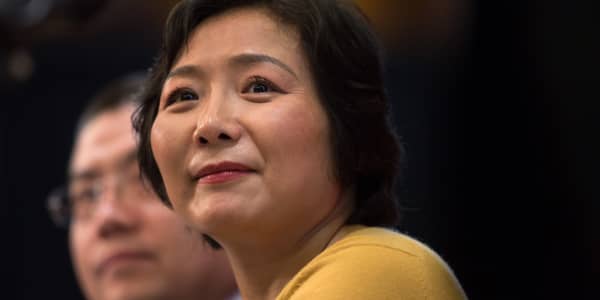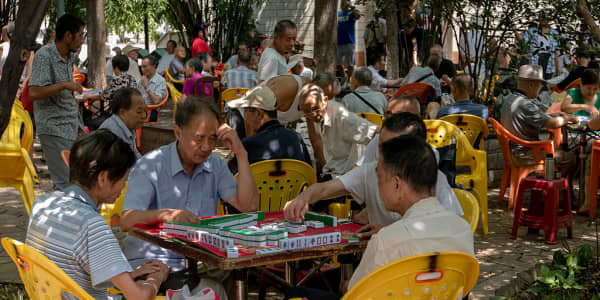In an indoor riding ring built atop a defunct driving range, twelve children trot ponies in tight circles, responding to the terse commands of maroon-coated instructors that pace the center of the ring in tall boots.
The stable, tucked amid the urban sprawl spanning the southeastern corner of Beijing's clogged fifth ring road, is the first in Beijing to specialize in teaching children. The ponies have all been flown in from France. So too have some of the instructors. The rest have been trained there. The turf on which the ponies walk, trot and canter has been specially calibrated to cushion the impact should the small riders tumble from their mounts.
"It is a part of French culture," says Daiyu Jia, who sips lemon water as she watches her eight-year-old son post smartly around the ring. Then she corrects herself. "It is not only French culture. It is part of the old culture of the whole world. Long, long ago people in our country also rode horseback."
Even at the price of nearly $100 for a 45-minute private lesson, iPony's indoor arena is solidly booked on a chilly December Saturday, as parents eager to initiate their children in the ways of a global aristocracy line up for lessons. Learning the ways of a cosmopolitan elite is seen as good not only for status but also for business or, as in the case of Daiyu's son, for admission to foreign schools.
For years now, China's wealthy have been exploring the subtler side of Western status, paying a premium to complement their taste for chauffeured Bentleys, Hermes handbags and world travel with the manners and the esoteric cultural knowledge to match.
More recently, though, as China establishes itself as a financial superpower, it has increasingly exerted its own force on the definition of global etiquette, with elites picking and choosing from a grab bag of norms; some all but excavated from Europe's aristocratic past, some from the playbooks of modern-day Emily Posts and, increasingly, casting their eyes closer to home, plumbing classic Daoist, Confucian and Buddhist texts for clues to a proper comportment that does not feel contrived.
"I have seen the Chinese elite learning so quickly," says Sara Jane Ho of the Institute Sarita, which offers courses in etiquette in Beijing and Shanghai.
In the past, most of her clients had never heard of the New England boarding school, Philips Exeter Academy, that Ho attended as a girl. "Five years ago nobody knew what Exeter was…They have become more exposed, so much more well traveled, so much better informed."
Such learning travels both ways. European aristocrats have discovered that Chinese customers will pay handsomely for courses in old world etiquette and a taste of the aristocratic life. Belgium's Atlas International Culture offers Chinese travelers the chance to clink glasses with royalty in grand residences and castles.
For half a day clients can spend a morning with a Marquis, touring the grounds of his estate and learning the history of his family before embarking on a two-hour lunch during which the Marquis explains the function of various pieces of cutlery and discourses on wine, food and the importance of putting others at ease.
"What we try to do is put Chinese in a real 3D environment in this castle with a marquis," said Atlas's head of cultural tourism, Lionel Kohn. "For the Chinese, it's about being able to talk and eat with a marquis and also for the status to say I have been studying European etiquette with a marquis."
It hasn't always gone so smoothly. When a group of bankers booked the Chimay Castle in Belgium for a lunch, Atlas invited a Belgian prince and princess to host. The bankers cleaned their plates and stood up. They were off to another meeting.
"The prince and princess were a bit shocked," said Kohn. "People just came to their castle, ate and left. Food and banquet culture here is still very important – but there is a difference between how they do it and how we do it."
And at iPony, administrators found that when it comes to teaching their children to ride, French and Chinese parents have much in common: a reverence for the horse, a playful approach and aspirations of grace and feats of derring-do.

It was only on the matter of shoveling manure, washing sweaty ponies and polishing tack – all elements of the French riding curriculum, Galop, which the stable offers - that they see things differently.
"When I pay so much money, I would rather see my son on the horse than cleaning it," says Daiyu.
She, like many other iPony parents, is more interested in the finer skills of horsemanship – the ability to convince a horse to lead his canter with one or another foot, an elegant seat and, eventually the chance to compete. Most of all, what she would like for her son is a release from long school days and onerous homework assignments. And this, at least, seems to be working.
"I love riding," says her son, Alan, arriving beside her, his cheeks flushed, eyes sparkling. "It is like flying."
Manure or no, iPony is a decidedly more down-to-earth take on foreign culture than that offered at Ho's institute.
The Institute's website features Ho and her team – a group of wasp-wasted, glowing young women in cocktail dresses with top drawer resumes in finance and credentials from overseas institutions like Oxford, Harvard and Middlebury. When Ho isn't doing business, traveling, scuba diving or riding in horse shows, she is teaching $12,000, 10-day "Hostess" and "Debutante" courses to wealthy Chinese women.
"When they come to my school, they want my lifestyle," said Ho, who spoke to CNBC by phone from Macau where the luxury duty-free behemoth DSF Group had flown her in to teach a workshop to top clients. "They travel very frequently so they go to Tahiti for a holiday or Dubai. But they also usually have a need -- they are expanding their company overseas or getting property and citizenship abroad or sending their kids to boarding school."
It is easy to see why DSF would hire Ho, whose Hostess curriculum includes lessons on "understanding luxury brands" and visits to couture stores.
But a recent tendency among Ho and her clientele might give them pause.
"One trend you see among elite is them going back to understand ancient spiritual texts, especially for people in the twenties and thirties, including me" she said. "A lot of elites turn towards Buddhism. They have found a kind of success and they are looking for something that is beyond material possessions."





